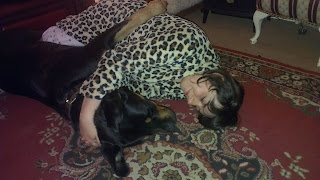 |
| Zoe, aged one, with her mother |
It was a life marked by four deaths: four inflections in the path.
Zoe was a child of Auchencairn, the field of stones, between the blue line of the granite and the grey line of the sea. The primary school she went to had thirty pupils. Even in that small place, Zoe was a solitary child, often solemn, with few close friends.
She was brought up by her mother, my sister, who was bright and sociable and full of changing enthusiasms, but also ill; and by her grandmother, my mother, who was academic and intellectual and who mostly sat in her chair and read books, or wrote; and to a much lesser extent by me, with whom she had adventures and all too often ended up in deep water.
Her mother was ill, and in pain, and that was just how it was. She was brave, and rarely complained, and so when she had a persistent cough, she still didn't complain. After a year she went to hospital for it to be checked out. Thirteen days later she was dead, of cancer. Zoe was sixteen.
 |
| My mother; Zoe's grandmother |
Two deaths. She was eighteen. But she did well enough in her course in her theatre course in Edinburgh to earn a place at Dartington.
At Dartington she met Rachael, who was the love of her life. But they met because Rachael, learning that she had terminal cancer, went to the other person on her course whose life, she knew, had been touched by cancer: to Zoe. In that meeting, in that falling in love, in that romance and relationship and marriage, the ending was known from the first day.
The knowledge of that ending cost Zoe. At times she denied it, but it always hung over them. They went and had adventures together - and got into deep water together - and lived life as fully as they could, knowing that their time was limited. It was not as limited, in fact, as they expected: the doctors had told Rachael she might live four years; she lived twelve.
But death came, and that death was brutal.
 |
| Rachael (centre) and Zoe (right) |
Again, Zoe lost the most important person in her life, and with her, her home. Her family was reduced to two dogs, Winston, Zoe's own dog, and Lola, who had been Rachael's.
Three deaths. She was thirty four.
Zoe moved with the dogs to a new flat; not a bad flat, in itself. I came down to help her move, and to help her decorate it. She was in grief, as anyone would expect her to be; but it seemed at least she had a safe base.
Winston was a very big, powerful dog. He was not, in my opinion, a vicious or aggressive dog. But he and Zoe were close, and when Zoe was upset, he wanted to protect her; and she was upset. And so there were a series of incidents in which Winston displayed aggression towards people who, he may have thought, threatened Zoe. She became very afraid he would attack someone, and that she would not be able to control him.
 |
| Zoe with Winston |
Four deaths. She was thirty five.
And yes, of course he was 'only a dog'. But he was her dog, and pretty much the only committed relationship she had left. She had let him down; she had, in a sense, betrayed him to his death. He was only a dog, but that understates the freight of guilt and grief that death carried.
Zoe died of grief. She had cause to die of grief. Most of all for Rachael, her wife; but also for those other three deaths: her grandmother, her mother, her dog.
And I cannot grieve her death. Her suffering is over. My grief is that, if her mother Jenny had not died, if her dog Winston had not died, most of all if her wife Rachael had not died, Zoe would not now be dead. Zoe would not now be struggling with mental illness. Zoe would be well, creative, inspiring, quirky, eccentric, exasperating, happy.
Do not grieve this death, for in this death there is grace. Grieve, if you must, with me, the inflections in the path.